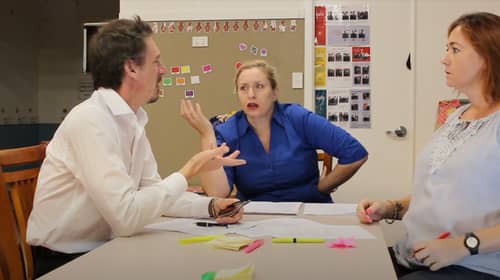Can Members Request a General Meeting?
Authored by:
iClick2Learn Team
Translate Text
So for members of an organisation, can you request a general meeting?
You can, you definitely can. So if you’re a financial member of an organisation, and so that word financial is an important one. For some, it’s not a payment, it’s a zero financial membership, but it’s still, it’s a category of membership, because being a financial member enables you to have voting rights, it enables you to have rights like requesting a meeting. There are very specific parameters that you need to meet, though, and that’ll be outlined in your constitution. So for example, and a general meeting, just to clarify, is a meeting of members, and it’s not a meeting for anything specific. That would be a special general meeting. And the constitution also outlines the things that can be raised at those different types of meetings. So there’s three types of meeting: general meeting, special general meeting, and an annual general meeting. And members can call and ask for general meetings to be called and special general meetings to be called. The AGM is the remit of the governors, unless they haven’t had an AGM and the members need to take action. So your constitution will say, so let’s just say I wanted to get a, let’s go to a clause in a constitution and I want to propose a change, then I would request a special general meeting be held. But I might, as per my constitution, I might need to have five other financial members join me in the request to the board.
Right.
And the key thing is that the board, or the committee, your governors, they cannot refuse a request, providing you fulfil the parameters within your constitution to have that meeting.
Okay.
Yeah, so there might be, so depending on what, if you’re doing it to, you’re wanting a meeting that doesn’t fulfil any of the requirements of calling a meeting, well, that might classify a refusal in a conversation. ‘Because there are certainly people that they might think, oh, we’re gonna overthrow the board, vote no confidence, et cetera, with just cause sometimes, of course, but you must make sure you follow the constitution when calling a meeting or when requesting for a meeting to be called. Great question.
Is there a cap on how many you can request, and if so, is that also included in the constitution?
So there’s not a cap on the number of meetings you can request. Again, unless the organisation has put something like that in the constitution. And this is the challenge, constitutions are all different. So I’m talking about this as a general constitution, and this would be an example of a template constitution or a model that someone might have downloaded either from the local, sorry, the state legislature, like New South Wales, it’s fair trading. It could be the ACNC, as well if they’re a charity and they use that template. But organisations have the ability to make changes. So providing there hasn’t been anything put in there by the organisation around a cap of the number of meetings you can request, then yeah, as long as you’re fulfilling those parameters, you can request as many meetings as a member, you and the other people who you need, as a member, as you deem fit.
Okay.
Mind you, if you’ve got members constantly calling for meetings, you need to look at the overall problem of the organisation. Like, constitutions normally state a minimum number of meetings that the committee must have, and in New South Wales, in the standard rules, I believe that’s three. Most organisations have a monthly committee meeting. I understand it’s up to the committee as to who’s eligible to go to those meetings. Some limit it, it is only the committee members are allowed to the committee meetings. Some open their committee meetings up, some make them general meetings, that members and the committee are there. You just need to have a chat with the committee first and see what’s the best way of handling it. There are some issues that should only be dealt with at a committee level, and the general membership doesn’t need to know all the ins and outs of every single decision. Maybe the committee will come back and give a summary of the decision they made. We don’t necessarily need to know how they came to that decision, unless it’s a really gross negligent decision, then you can look it. But in general, there are a lot of things that just happen, the ordinary members just don’t need to have those details. So you need to work out that level between the different levels of your own groups as to who’s involved in what aspects of it. And a lot of the ordinary members get bored of the minute detail. Do we really need to know that you just spent a dollar on buying a brand new pen?
Six dollars on a pen, yeah.
So it just depends on what it is and as to why you want to call your meeting. Likewise, special general meetings shouldn’t be called just for getting the group together. They are for a special purpose. I’ve been involved with a couple of groups here in Junee where we’ve done name changes and we’ve wanted to do it before the annual general meetings come up, because they want to move on and do things. We can’t do it until that’s done. That’s reason to call in a special general meeting. Just to discuss what are we doing with the barbecue next weekend is not a special general meeting, and maybe not even an actual meeting. Maybe a quick email can go out saying, okay, Fred’s doing nine until two, Mary’s doing two until five, anyone else who can turn up at those times, great. We may not need a meeting for that.
Yeah, and just expanding on the reason for calling a meeting, again, that the constitution says if a special general meeting will be called, here are the very specific reasons why it’s required. So again, that detail is in there. Thanks, Nick, that’s wonderful to add to the knowledge. The great thing about the peer group in the learning library, it’s fantastic when others are kind of sharing their experiences with things that you’ve gone through as well.
Related posts
Starting a Not-for-Profit
Accidental Counsellor
Developing a Fundraising Plan
Create a Sponsorship Plan
How to Develop a Logic Model [Course]
Social Impact
Develop Your Event Plan
Approving Your Budget
5 Tips for effective meetings
Board Assessments and Evaluations: An Introduction
Legal Structures
Organisational Structure
How to Run Your AGM
Governance and Your Organisation
3 Essential Financial Documents
Staying On Top of Your Financials
Informed Decision Making in Your Not-For-Profit
What is a Code of Conduct and Why Do You Need One?
Getting to Know Your Constitution
Governance Risks for Service-Based Organisations
- Tags | Boards and Committees, Meetings




















